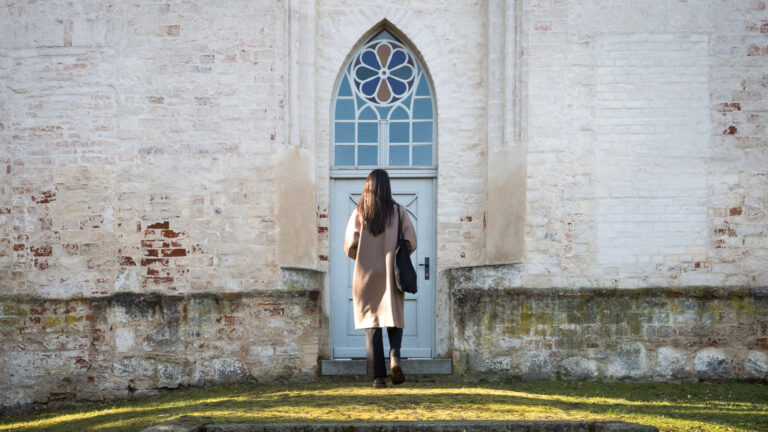Last week, my wife and I dropped our firstborn off at college. I wasn’t prepared for the deluge of emotions that have poured over me these last few days.
In particular, I wasn’t prepared for the surprise attack of regret.
I’m not someone who spends much time regretting things. I’m an optimist. But in the days leading up to my son’s move, an unexpected sense of dread and fear came over me, paired with pangs of guilt over the ways I knew I’d failed him as a father, and over the failures I couldn’t yet see but were there nonetheless.
So many questions have risen up in me—questions that carry a tone of accusation. Have I prepared him for life as an adult? Have I instilled in him a sense of reverence for God? Have I given him what he needs to walk upright in a bent world? Have I modeled a life of faith for him, one that he can imitate? What have I withheld? Why didn’t I sit with him more when he was in the house?
As I began to take stock of these questions, I was confronted with the inescapable reality that, in many ways, I’ve been far from perfect. On many occasions, I chose myself over him. I prized my solitude too often when he was right there, available, within the sound of my voice. Some days I lost my temper with him. There were times I said shaming words. I could go on. The list of my shortcomings as a father is long.
Calling Out to My Covenant God
The day after we dropped him off, I went on an overnight solo hike deep in the heart of the Cumberland Plateau. I’ve hiked this particular wilderness area with my son several times. We both know it well. I went there to pray, to journal, to work through what was going on inside me, and to grieve. I felt like a feral creature, going off into the lonesome woods to howl my prayers at the heavens—and that’s just what I did. I voiced my regret, my fear, my grief, my feelings of guilt. I pleaded with the Almighty for my son—that God would spare him from the consequences of his father’s selfishness, sin, and limitations.
I also read the book of Luke, front to back. Luke was written to Theophilus, whose Greek name reveals why Luke took time to explain Jewish customs. Theophilus, a Gentile, was new to many of the foundational doctrines of Christianity that were rooted in God’s covenant with Israel. Luke wrote to show there was more going on than Theophilus could see—layers below the surface of the faith he’d embraced. I read Luke through Theophilus’s eyes, as a man with a new set of questions about my ancient faith.
God has been at work in his world down through time. His faithfulness to one generation is rooted in promises made to generations who lived long before. My faith in God rests on promises he made to people who lived millennia ago, on the other side of the world, people with whom I don’t share a language, skin tone, government, economy, or climate. What we do share is a God who knows the shortcomings and failures of his people and loves them still. He loves not with a passive love, but with a searching, redeeming, active love—the greatest kind, which his Son describes as the sort that compels you to lay down your life for your friends.
Rehearsing Truth and Hope
As I called out to the Lord for my child (and let’s be honest, for his father too), I rehearsed some of the ancient doctrines I know to be true. First, I’ve never been in a position to save my son. I can model faithfulness, but his faith must be his own. I can discuss things that matter, but I can’t make them matter to him in the ways they matter to me. I can invest in shaping his character, but the heart? Who can search it? The things I wished I could have done for him were never within my power.
Second, of course I have failed him. My son tells me I’ve been a good father, but I know I haven’t been anything close to a perfect father. I know I’ve wounded him at times. I was talking with a friend who said he went through the same thing. Friends would assure him he’d been a good dad, but it was a small comfort because he knew the ways he wasn’t. Then one friend simply said, “Of course you’ve failed. Who hasn’t? But listen, God redeems that stuff.”
No one will ever convince me I’ve been a perfect father. I know I haven’t. But my hope doesn’t rest in getting it right the first time. My hope rests in the redemption and restoration of all things in Christ.
Third, my Redeemer has loved my son better and longer than I ever have or ever could. There is a mystery here. I don’t know what the Lord intends for my son. I don’t know what suffering or joy awaits him. I don’t know the number of his days, where he will live them, or with whom he will share them. But I know my son is loved more perfectly and more deeply by our heavenly Father than I could ever love him, even if all my days with him were good days. I must entrust my son to my heavenly Father. What else can I do?
I’m still working through these feelings of grief and regret, but not without hope. The truth is I can’t save my son from misery. I’ve failed him in a host of ways. But if I stop here, regret wins. There is more to our story than this, my dear Theophilus. My son is known by the Maker and Lover of his soul, and he has been since before the foundation of the world. And there my hope resides.
Involved in Women’s Ministry? Add This to Your Discipleship Toolkit
 We need one another. Yet we don’t always know how to develop deep relationships to help us grow in the Christian life. Younger believers benefit from the guidance and wisdom of more mature saints as their faith deepens. But too often, potential mentors lack clarity and training on how to engage in discipling those they can influence.
We need one another. Yet we don’t always know how to develop deep relationships to help us grow in the Christian life. Younger believers benefit from the guidance and wisdom of more mature saints as their faith deepens. But too often, potential mentors lack clarity and training on how to engage in discipling those they can influence.
Whether you’re longing to find a spiritual mentor or hoping to serve as a guide for someone else, we have a FREE resource to encourage and equip you. In Growing Together: Taking Mentoring Beyond Small Talk and Prayer Requests, Melissa Kruger, TGC’s vice president of discipleship programming, offers encouraging lessons to guide conversations that promote spiritual growth in both the mentee and mentor.

































